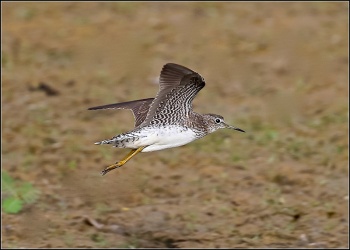(→External Links: Combined English and scientific names.) |
(id) |
||
| (One intermediate revision by one other user not shown) | |||
| Line 8: | Line 8: | ||
*White eye-ring | *White eye-ring | ||
====Similar Species==== | ====Similar Species==== | ||
| − | [[Green Sandpiper]], which has a white rump. | + | [[Green Sandpiper]], which has a slightly less slim build, a white rump and lacks dark tip on undertail coverts and along the side of the rump. |
[[Image:Solitary Sandpiper Country Club Lake Bryan2.jpg|thumb|350px|right|Nominate subspecies<br />Photo © by {{user|Stanley+Jones|Stanley Jones}}<br />Country Club Lake, Bryan, Brazos County, [[Texas]], [[USA]], 9 August 2019]] | [[Image:Solitary Sandpiper Country Club Lake Bryan2.jpg|thumb|350px|right|Nominate subspecies<br />Photo © by {{user|Stanley+Jones|Stanley Jones}}<br />Country Club Lake, Bryan, Brazos County, [[Texas]], [[USA]], 9 August 2019]] | ||
==Distribution== | ==Distribution== | ||
| Line 40: | Line 40: | ||
==References== | ==References== | ||
#{{Ref-Clements6thAug19}}#Avibase | #{{Ref-Clements6thAug19}}#Avibase | ||
| − | Van Gils, J., Wiersma, P. & Kirwan, G.M. (2019). Solitary Sandpiper (Tringa solitaria). In: del Hoyo, J., Elliott, A., Sargatal, J., Christie, D.A. & de Juana, E. (eds.). Handbook of the Birds of the World Alive. Lynx Edicions, Barcelona. (retrieved from https://www.hbw.com/node/53909 on 17 August 2019). | + | #Van Gils, J., Wiersma, P. & Kirwan, G.M. (2019). Solitary Sandpiper (Tringa solitaria). In: del Hoyo, J., Elliott, A., Sargatal, J., Christie, D.A. & de Juana, E. (eds.). Handbook of the Birds of the World Alive. Lynx Edicions, Barcelona. (retrieved from https://www.hbw.com/node/53909 on 17 August 2019). |
#Collins Field Guide 5th Edition | #Collins Field Guide 5th Edition | ||
#Collins Bird Guide ISBN 0 00 219728 6 | #Collins Bird Guide ISBN 0 00 219728 6 | ||
#[http://www.barcodeoflife.org/barcode/batsbirds/literature/MEN1670_final.pdf Paper] describing genetic divergence within Solitary Sandpiper | #[http://www.barcodeoflife.org/barcode/batsbirds/literature/MEN1670_final.pdf Paper] describing genetic divergence within Solitary Sandpiper | ||
{{ref}} | {{ref}} | ||
| + | |||
==External Links== | ==External Links== | ||
{{GSearch|"Tringa solitaria" {{!}} "Solitary Sandpiper"}} | {{GSearch|"Tringa solitaria" {{!}} "Solitary Sandpiper"}} | ||
Latest revision as of 20:16, 9 March 2024
- Tringa solitaria
Identification
18-21 cm (7-8¼ in)
- Dark upperparts with whitish spots
- Greyish head and breast
- White underparts
- White eye-ring
Similar Species
Green Sandpiper, which has a slightly less slim build, a white rump and lacks dark tip on undertail coverts and along the side of the rump.

Photo © by Stanley Jones
Country Club Lake, Bryan, Brazos County, Texas, USA, 9 August 2019
Distribution
North America: Canada, USA, Alaska
Central America: Mexico, Guatemala, Belize, El Salvador, Honduras, Nicaragua, Costa Rica, Bermuda
Caribbean: Greater Antilles, Lesser Antilles, Windward Islands, Leeward Islands, Bahamas, Cuba, Turks and Caicos Islands, Cayman Islands, Hispaniola, Haiti, Dominican Republic, Puerto Rico, Virgin Islands, Anguilla, Antigua, Barbuda, Guadeloupe, Dominica, Martinique, Barbados, Trinidad, Tobago, Netherlands Antilles
South America, Colombia, Venezuela, Guyana, Suriname, French Guiana, Ecuador, Peru, Bolivia, Brazil, Paraguay, Uruguay, Argentina
Taxonomy
Subspecies

Photo © by Stanley Jones
Country Club Lake, Bryan, Brazos County Texas, USA, 9 August 2019
There are 2 subspecies[1]:
- T. s. solitaria (Eastern):
- Eastern British Columbia to Labrador; winters central and South America
- T. s. cinnamomea (Western):
- Alaska and western Canada; winters northern South America to Argentina
There seems to be a deep genetic divergence between eastern and western birds, which may in the future lead to a proposal for two full species.
Habitat
Fresh water marshes and ponds.
Behaviour
As its name suggests they are normally seen singly during migration. Small numbers may gather in feeding areas.
Diet
The diet consists of small invertebrates, spiders, grasshoppers and occasionally frogs. Feeds at pond edges.
Breeding
They often utilise an abandoned songbird's tree nest, laying 3-5 eggs.
Vocalisation
A three-note whistle is uttered in flight.
References
- Clements, J. F., T. S. Schulenberg, M. J. Iliff, S. M. Billerman, T. A. Fredericks, B. L. Sullivan, and C. L. Wood. 2019. The eBird/Clements Checklist of Birds of the World: v2019. Downloaded from http://www.birds.cornell.edu/clementschecklist/download/
- Avibase
- Van Gils, J., Wiersma, P. & Kirwan, G.M. (2019). Solitary Sandpiper (Tringa solitaria). In: del Hoyo, J., Elliott, A., Sargatal, J., Christie, D.A. & de Juana, E. (eds.). Handbook of the Birds of the World Alive. Lynx Edicions, Barcelona. (retrieved from https://www.hbw.com/node/53909 on 17 August 2019).
- Collins Field Guide 5th Edition
- Collins Bird Guide ISBN 0 00 219728 6
- Paper describing genetic divergence within Solitary Sandpiper
Recommended Citation
- BirdForum Opus contributors. (2024) Solitary Sandpiper. In: BirdForum, the forum for wild birds and birding. Retrieved 27 April 2024 from https://www.birdforum.net/opus/Solitary_Sandpiper
External Links
GSearch checked for 2020 platform.1




